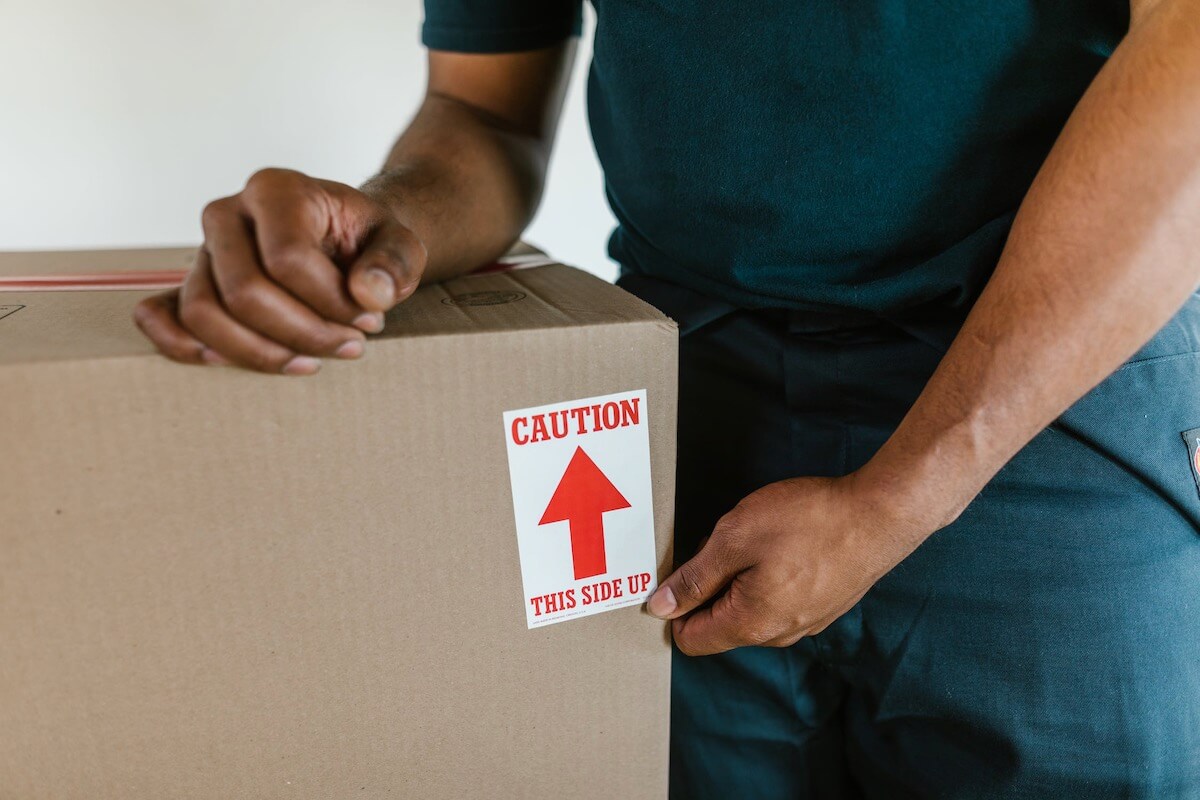How to Pack Books When Moving
Are you planning a relocation to a new home soon, but have no idea what to do with your sizeable home library? Then you should probably take the time to learn some tips on how to pack books for moving or storage. Doing so improperly could easily result in your beloved belongings getting damaged. But there’s no need to worry! To help you avoid that, we’ve put together this handy guide with tips for handling print publications for a relocation. Simply follow these steps and you won’t have to worry about a thing.


You finally decided where to move, you know the reasons for moving, and now is the best time of the year to move.
However, before you start putting books into the medium-moving boxes, look at your inventory list (or a photo inventory).
Take some time to pick out the titles you won’t be taking with you. Perhaps you have several copies of the same book?
Or maybe you have a book or two you know you’ll never read again. Considering the average American reads only 12 books yearly, you might have more unread books than you realize. Whatever the case is, put those in a separate pile for unwanted items to donate and consider selling them on Craigslist or donating them to charity. There’s no need to carry them all, especially if you’re planning your moving budget to the T, reducing the relocation costs, or even going into a smaller home.
The Best Way to Pack Books for Moving Is To Divide Books into Categories
Now that you’re left with a pile of items that have made it to the relocating to another state checklist, it’s time to get them organized. Divide everything into meaningful categories to make packing easier. Here are a few tips you could use:
- Sort by cover type – dividing all your collections into hardcover and paperback is a great first step. This will help you organize them easily for the boxing-up process.
- Sort by size – additionally, you may want to sort them by their dimensions, as this will make it easier to fit them into appropriate-size boxes. Always put lighter ones on top.
- Sort by shelf – while this method might not be that handy for packing, it will certainly make unpacking easier. Simply group those titles that you keep on the same shelf and pack them as such.
All of these hacks can help you have a more efficient transition. Moreover, settling in will be much easier when you can easily find your favorite author. If you didn’t manage to find a job before moving to another state, or you’re still on a house-hunting mission then avoiding relocation depression should be your priority. Luckily, reading for 6 minutes can lessen stress by 68%. So, with your favorite tome in your hands, you can easily unwind from all that stress and concentrate on starting anew.
Use Smaller Boxes for Books
Always use the smallest boxes possible to pack your titles. These will be more likely to sustain the weight they carry, as larger ones could give in at the bottom. Alternatively, you might want to use a suitcase for heavier and larger volumes, ensuring their safety.
How to Protect Paperback Books? Use a Lot of Protective Materials
Before you start filling the box, cover its bottom and all its sides with at least two layers of protective paper. If you’re packing more expensive or rare volumes, you might even consider using bubble wrap or cardboard. Additionally, add protective layers between every two items for extra padding. Remember to do this if they are going to storage first.
When Packing Books for Moving Cross-Country, Alternate Between Bound Edges
Need some more long-distance relocation tips for taking care of your novel collection? When stacking your book collection, either vertically or horizontally, don’t forget to alternate between bound edges. This will help protect the contents from moving around or stacking unevenly.
However, when it comes to paperback issues, you should avoid stacking them bound edge up. Teir covers aren’t sturdy enough to keep them in that position for too long, especially when they’re on the moving truck.


Tips on How to Pack Books for Moving – And How Not To
Now that you know what the most important things you should do are, it is time to move onto things you should absolutely avoid doing. Without further ado, here are the most common moving mistakes people make when packing books for a relocation. Keep these tips in mind to make sure your belongings stay intact.
Not Preparing Books for Storage During Relocation
If you’re planning on storing your belongings in a storage unit for some time, there are certain things you should do to ensure your print survives this. Namely, you should use acid-free materials and waterproof protection. Worry not.
If you are booking Cross Country Moving Company to handle your relocation, you will have access to the top-notch facilities. More importantly, we offer you 30 days of free storage services. For added peace of mind, our facilities are monitored 24/7 and climate-controlled.
Being Too Quick to Pack
Even if you’re working on a short deadline to move into your new home, you should take the time to carefully pack your belongings from your moving-out list. Rushing through this task could easily result in unfixable damage to your items.
So, one of the most important moving tips we have is to start with the organization process at least 6-8 weeks before the move. Remember to take your time when handling these belongings. This will ensure they reach you in pristine condition.
Using Improper Supplies
Not using the right materials is a recipe for disaster. For example, if you use large boxes, you run the risk of the crate breaking and all of its contents falling out. If you use newspapers instead of clear paper for protection, the ink from the print might end up rubbing off on your items. So don’t hesitate to invest a little more in proper supplies and get some bubble wrap and packing paper.


Leaving Empty Space in a Box
One of the most important things you should do before sealing the box with packing tape is to fill voids. You can use packing paper, foam peanuts, or even pieces of cloth to do this. The important thing is to make sure the contents of the box don’t fly around and get damaged, to move them safely to the new place.
Being Lazy With Labeling
We all know how important it is to label your boxes. Writing down the contents of each box will help you unpack in a much more organized manner later on.
However, it probably won’t be enough to simply write “books” on a box. You should at least at the category as well, such as “textbooks”, “dictionaries”, or “living room shelf”. And if you have some time on your hands, you might even write down every single title.


When You Learn the Best Way to Pack Books When Moving, Proceed with Your Preparations
Now that you know how to tackle this task, and how to lower moving expenses, it’s time to check the safety of your future neighborhood. It’s also crucial to decide whether you’ll move during the holidays or maybe in the summer. If you’re moving alone to another state, to avoid relocation anxiety make sure you find a cross-country moving company that has good reviews. Find a highly recommended partner that offers a wide array of other services you might need, such as auto transport or packing services.
Once you have gathered all the necessary information, consider factors such as the weather and seasonal conditions when choosing your moving date. Relocating during the holidays or in the summer may offer certain advantages, such as better weather or more flexible schedules. By carefully weighing these factors, you can make a well-informed decision that suits your preferences and circumstances.
Feel free to ask more about this process or their services, and how they pack clothes or handle box up bulky furniture. They will also explain to you how car shipping works in case you’re planning to transport your vehicle across the country. If you like the answer, you can ask for a free estimate and book your relocation date.

Auto Transport
Cross Country Moving Company is the most trusted name in auto industry in the country.
Moving Insurance
Cross Country Moving Company is the most trusted name in the relocation industry in the country.

Storage
Cross Country Moving Company is the most trusted name in auto industry in the country.
Have a Smooth Chapter in Your Move With Cross Country Moving Company
When it comes to relocating your library, our specialized book long-distance moving services ensure that your literary treasures arrive safely at their new home. Whether you have a modest collection or an extensive array of rare editions, we understand the sentimental and monetary value of these possessions. Our team uses acid-free packing materials and sturdy medium-sized boxes to protect against damage during transit.
We carefully store everything to prevent warping, creasing, or spine damage, and we can even create custom crates for particularly valuable or antique volumes. With our expertise, you can trust everything will be well-protected throughout this journey. Contact us today and let our crew guide you through this adventure.
FAQ
What Is the Best Way to Pack Books for a Move?
The best way to pack books is to use sturdy, small to medium-sized boxes and line them with packing paper or bubble wrap to create a cushioned base. Start by packing larger, heavier books at the bottom of the box, and then fill the box with smaller, lighter books on top.
Pack items of similar size together to avoid damage, and avoid overpacking the boxes to prevent them from becoming too heavy. You can also use packing tape to reinforce the bottom of the box and prevent it from breaking or spilling during transport. Lastly, label the box with the word “books” and the room they belong in.
Should I Pack Books in Boxes or Other Containers?
If you don’t have access to relocation boxes and don’t want to get help from a long-distance moving company, you can use other containers such as plastic bins or suitcases. These are the perfect solutions as long as they are strong enough to hold the weight of the books and have secure closures.
How Many Books Can I Pack In One Box?
The number of books that can be packed in one box depends on several factors, such as the size of the books and the size of the box. Generally, a standard box measuring around 16 x 12 x 12 inches can hold around 25 to 30 books of average size. However, if the books are larger or smaller in size, the number of books that can fit in the box may vary.
What Materials Do I Need to Pack My Books?
Firstly, you will need sturdy boxes that are of an appropriate size for your books. You will also need packing materials such as bubble wrap, packing paper, or foam peanuts to cushion your books and prevent them from shifting during transport. It is also important to have strong packing tape to seal the boxes securely, and a marker to label the boxes with the contents.
Can I Pack Books With Other Items or Should I Keep Them Separate?
It is generally not recommended to pack books with other items, as they may get damaged during transit. Books are heavy and may crush or damage other items in the same box, especially if the other items are fragile or delicate.
How Do I Prevent My Books From Getting Damaged During the Move?
To prevent books from getting damaged during a move, the best option you have is to get long-distance moving services from cross-country movers. However, if you wish to pack on your own, use sturdy containers and line the bottom of the box to cushion the content.
Place the books in the box spine down and fill any gaps with more packing materials. It is important to not overpack the box, as this can cause it to become too heavy and increase the risk of damage during transport. Seal the box securely with strong tape and label it with the contents and any handling instructions.
Should I Pack Books Vertically or Horizontally in the Box?
Packing books vertically may help to maximize space in the box and prevent them from shifting around during transport. It can also make it easier to see the titles of the books and access them. However, packing books horizontally can distribute their weight more evenly and prevent damage to the spines. . Ultimately, the best method will depend on the type of books, the size and shape of the box, and personal preference.
Should I Use Bubble Wrap or Other Materials to Wrap My Books?
Bubble wrap is a popular choice because it provides cushioning and shock absorption, which can help to prevent the books from being bumped or jostled. Other materials such as packing paper, foam sheets, or even old clothes or towels can also be used to wrap books.
What’s the Best Way to Label My Book Boxes?
The best way to label your book boxes is to be clear and specific. Start by marking the box as “books” and include the room where the box should be placed at the destination. You may also want to number the boxes and keep a corresponding list of the contents of each box.
Should I Hire a Professional Moving Company to Pack My Books for Me?
Hiring a cross-country moving company to pack your books for you can be a good idea if you have a large collection or you are short on time or physical ability. Professional long-distance movers are experienced in handling fragile and valuable items like books, and they have the right tools and materials to protect your books during transport.
Getting cross-country moving services can also save you time and effort, freeing you up to take care of other important relocation tasks. If you decide to go this route, be sure to research different cross-country moving companies and read reviews to ensure that you choose reputable and reliable movers.








